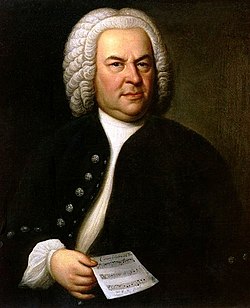"... the ultimate composers' composer" — John Eliot Gardiner
[1] Bach (*). I was attracted to this book by Andrew Clark's review: "If you want a balanced biography, this is not for you. The opening chapters are chaotic, lurching from self-reverential auto-biography to a jumbled account of Bach's Lutheran background. The seven years he spent producing the Brandenburg Concertos and other masterpieces at the Calvinist court in Cöthen are dismissed in a paltry page and a half. But if you want a detailed analysis of the cantatas, the two Passions and Mass in B minor, and a feeling for their wondrous piety, Gardiner provides exhaustive satisfaction. Discussing the allegorical dialogue between Jesus (bass) and the Soul (soprano), he explains how Bach juxtaposes the 'archaic' viola da gamba with the 'modern' oboe and basso continuo". Exhaustive satisfaction!
(*) John Eliot Gardiner. Music in the Castle of Heaven. London: Penguin, 2013 [website] [Andrew Clark: "A maestro's tribute", Financial Times, October 2013] [VIDEO: Bach, A Passionate Life, John E. Gardiner, BBC].
_______________
[2] Wellington (*). My Irish forebear, the beautiful Fanny Reed (later Frau von Schnörr), used to call the Duke of Wellington "my dear cousin". Thus I can boast, jokingly, of some shared ancestry with the man who defeated Napoleon! From the editors: "Rory Muir's masterly new biography, the first of a two volume set, is the result of thirty years research into Wellington and his times. The author brings Wellington into much sharper focus than ever before, critically examining every aspect of his life from his unhappy childhood, his baptism into British and Irish politics and his remarkable successes in India, to the setbacks and triumphs of the Peninsular War". Volume II, under the title Waterloo and the Fortunes of Peace, 1814-1852 is to be published, fittingly enough, in the spring of 2015.
(*) John Eliot Gardiner. Music in the Castle of Heaven. London: Penguin, 2013 [website] [Andrew Clark: "A maestro's tribute", Financial Times, October 2013] [VIDEO: Bach, A Passionate Life, John E. Gardiner, BBC].
_______________
[2] Wellington (*). My Irish forebear, the beautiful Fanny Reed (later Frau von Schnörr), used to call the Duke of Wellington "my dear cousin". Thus I can boast, jokingly, of some shared ancestry with the man who defeated Napoleon! From the editors: "Rory Muir's masterly new biography, the first of a two volume set, is the result of thirty years research into Wellington and his times. The author brings Wellington into much sharper focus than ever before, critically examining every aspect of his life from his unhappy childhood, his baptism into British and Irish politics and his remarkable successes in India, to the setbacks and triumphs of the Peninsular War". Volume II, under the title Waterloo and the Fortunes of Peace, 1814-1852 is to be published, fittingly enough, in the spring of 2015.
(*) Rory Muir. Wellington. The Path to Victory, 1769-1814. Yale University Press, 2013 [webiste] [lifeofwellington.co.uk]
_____________
 [3] Lord Mansfield (*). From Jeffrey Collins' excellent review: "Mr. Poser offers us a fascinating portrait. Facing the conflicts of a rapidly modernizing society, the Chief Justice of King's bench (1705-1793) often adapted, rather than applied, the law. Mansfield was also a celebrated rhetorician. Hearing another justice rule after him, wrote one contemporary, was 'a draught of hog-wash after a bottle of champagne'. Mr. Poser presents Mansfield as a man of the Enlightenment, but he was certainly not a crusader for individual liberty. He was a die-hard opponent of American independence. Mansfield was also an innovator, jettisoning common-law precepts that he considered outmoded and adopting principles of European civil law when useful. Declaring slavery an 'odious act of domination', he famously declared: Let justice be done, though the heavens fall."
[3] Lord Mansfield (*). From Jeffrey Collins' excellent review: "Mr. Poser offers us a fascinating portrait. Facing the conflicts of a rapidly modernizing society, the Chief Justice of King's bench (1705-1793) often adapted, rather than applied, the law. Mansfield was also a celebrated rhetorician. Hearing another justice rule after him, wrote one contemporary, was 'a draught of hog-wash after a bottle of champagne'. Mr. Poser presents Mansfield as a man of the Enlightenment, but he was certainly not a crusader for individual liberty. He was a die-hard opponent of American independence. Mansfield was also an innovator, jettisoning common-law precepts that he considered outmoded and adopting principles of European civil law when useful. Declaring slavery an 'odious act of domination', he famously declared: Let justice be done, though the heavens fall."(*) Norman S. Poser. Lord Mansfield: Justice in the Age of Reason. McGill-Queen's University Press, 2013 [website] [Wall Street Journal review by Jeffrey Collins].
_____________
[4] ¡Contra-revolución! (*). Mi amigo Patricio Clucellas presenta en Buenos Aires su libro sobre la contra-revolución en 1810 en el Río de la Plata. Junto a mi ensayo sobre Mariano Moreno (1, 2), este volumen obtuvo el premio Jockey Club 2010 sobre el bicentenario de la Revolución de Mayo. Con Patricio mantenemos un duelo fascinante —al menos para nosotros— sobre las fuentes intelectuales de Mariano Moreno. Él atribuye a España las grandes ideas de Moreno y de la Revolución; yo creo haber presentado —¡y lo seguiré haciendo!— pruebas irrefutables sobre la aplastante influencia de Raynal, Helvétius, Condorcet, Jefferson y otros (1, 2, 3).
(*) Patricio José Clucellas. Contrarrevolución. Los intentos para ahogar a Mayo de 1810. Buenos Aires: Torre de Hércules, 2013.
______________

No comments:
Post a Comment